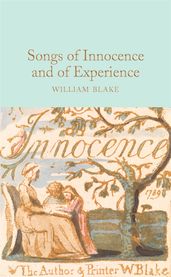Poems from William Blake’s Songs of Innocence and Experience
During his lifetime, Wiliam Blake was thought mad by many for his unconventional views on religion and the state, among many other topics. His illustrated poetry collection, Songs of Innocence and Experience, gives a voice to the views which separated him from his contemporaries. Here is just a small selection of poems and illustrations from the book.
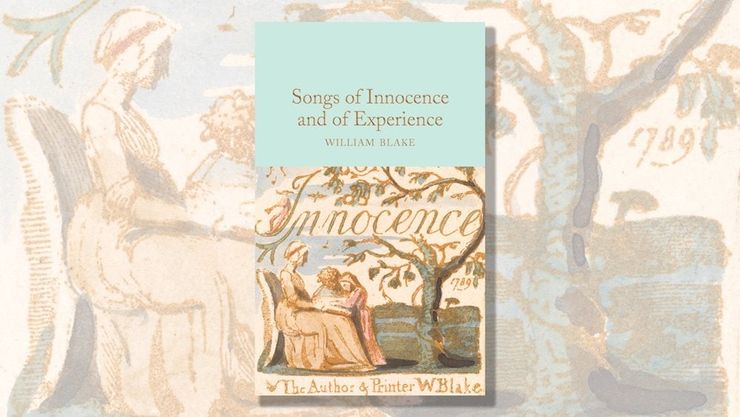
William Blake’s countless contributions to art and literature have been pivotal around the world, and his work is just as pertinent today, with an exhibition of his work exhibiting at Tate Britain as recently as 2019 to celebrate his enduring legacy.
Discover our edit of the best poetry books.
Despite being one of England’s most influential Romantic poets, William Blake was unappreciated during his lifetime. He was born in 1757 in a respectable neighbourhood and enjoyed a peaceful childhood that contrasts the struggles he felt later in life due to his radical outlook on politics. His exceptional poetry and art originated from religious visions at a young age and reflect his nonconformist perspectives on state oppression. His contemporaries thought him mad due to his unconventional views.
Songs of Innocence and Experience is possibly Blake’s most famous collection of poetry and epitomises his views on the state, race, child labour and the church. For example, in ‘The Chimney Sweeper’ he addresses the suffering caused by child labour, while in ‘The Garden of Love’ he highlights what he believed to be the corrupt and repressive influence of the church. He designed the full-colour plates and poems of Songs of Innocence and Experience to show the two opposing states of the human soul, varying from capturing the ideas of the ethereal nature of love to denouncing slavery.
Blake explores many themes in his poetry and artwork. If you’re unsure of where to begin we’ve selected some of our favourite poems and illustrations from his collection Songs of Innocence and Experience to help.
Songs of Innocence
The Chimney Sweeper
When my mother died I was very young,
And my father sold me while yet my tongue
Could scarcely cry ‘Weep! weep! weep! weep!’
So your chimneys I sweep, and in soot I sleep.
There’s little Tom Dacre, who cried when his head,
That curled like a lamb’s back, was shaved; so I said,
‘Hush, Tom! never mind it, for, when your head’s bare,
You know that the soot cannot spoil your white hair.’
And so he was quiet, and that very night,
As Tom was a-sleeping, he had such a sight! —
That thousands of sweepers, Dick, Joe, Ned, and Jack,
Were all of them locked up in coffins of black.
And by came an angel, who had a bright key,
And he opened the coffins, and set them all free;
Then down a green plain, leaping, laughing, they run
And wash in a river, and shine in the sun.
Then naked and white, all their bags left behind,
They rise upon clouds, and sport in the wind:
And the angel told Tom, if he’d be a good boy,
He’d have God for his father, and never want joy.
And so Tom awoke, and we rose in the dark,
And got with our bags and our brushes to work.
Though the morning was cold, Tom was happy and warm:
So, if all do their duty, they need not fear harm.
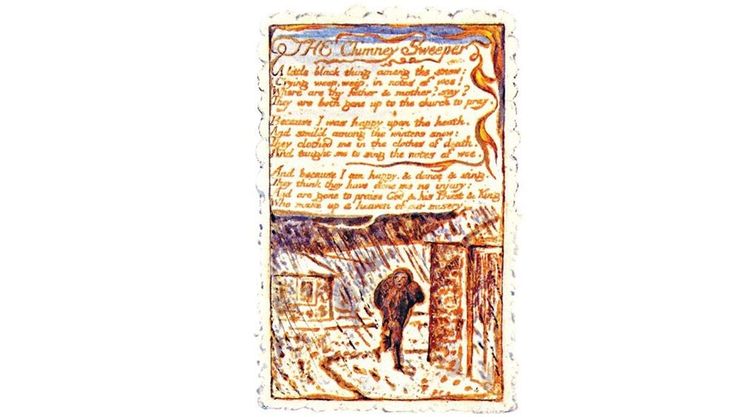
Laughing Song
When the green woods laugh with the voice of joy,
And the dimpling stream runs laughing by;
When the air does laugh with our merry wit,
And the green hill laughs with the noise of it;
When the meadows laugh with lively green,
And the grasshopper laughs in the merry scene;
When Mary and Susan and Emily
With their sweet round mouths sing ‘Ha ha he!’
When the painted birds laugh in the shade,
Where our table with cherries and nuts is spread:
Come live, and be merry, and join with me,
To sing the sweet chorus of ‘Ha ha he!’
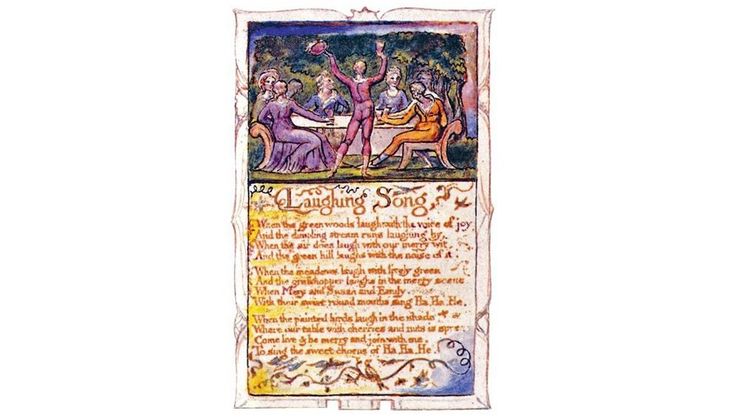
Night
The sun descending in the West,
The evening star does shine;
The birds are silent in their nest,
And I must seek for mine.
The moon, like a flower
In heaven’s high bower,
With silent delight,
Sits and smiles on the night.
Farewell, green fields and happy groves,
Where flocks have took delight,
Where lambs have nibbled, silent moves
The feet of angels bright;
Unseen, they pour blessing,
And joy without ceasing,
On each bud and blossom,
And each sleeping bosom.
They look in every thoughtless nest
Where birds are covered warm;
They visit caves of every beast,
To keep them all from harm:
If they see any weeping
That should have been sleeping,
They pour sleep on their head,
And sit down by their bed.
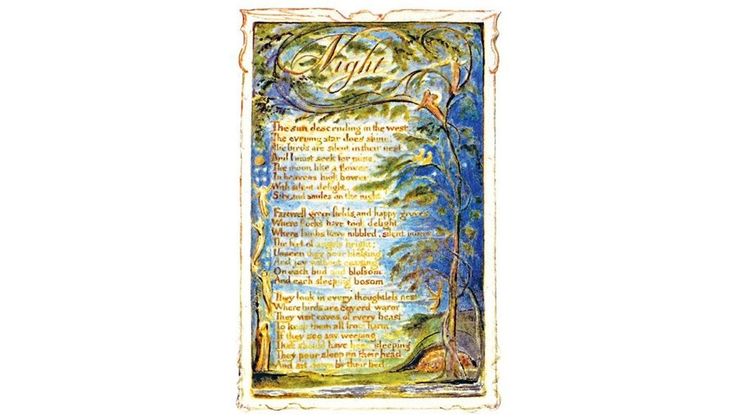
Songs of Experience
The Tiger
Tiger, tiger, burning bright
In the forests of the night,
What immortal hand or eye
Could frame thy fearful symmetry?
In what distant deeps or skies
Burnt the fire of thine eyes?
On what wings dare he aspire?
What the hand dare seize the fire?
And what shoulder and what art
Could twist the sinews of thy heart?
And, when thy heart began to beat,
What dread hand and what dread feet?
What the hammer? what the chain?
In what furnace was thy brain?
What the anvil? what dread grasp
Dare its deadly terrors clasp?
When the stars threw down their spears,
And watered heaven with their tears,
Did He smile His work to see?
Did He who made the lamb make thee?
Tiger, tiger, burning bright
In the forests of the night,
What immortal hand or eye
Dare frame thy fearful symmetry?
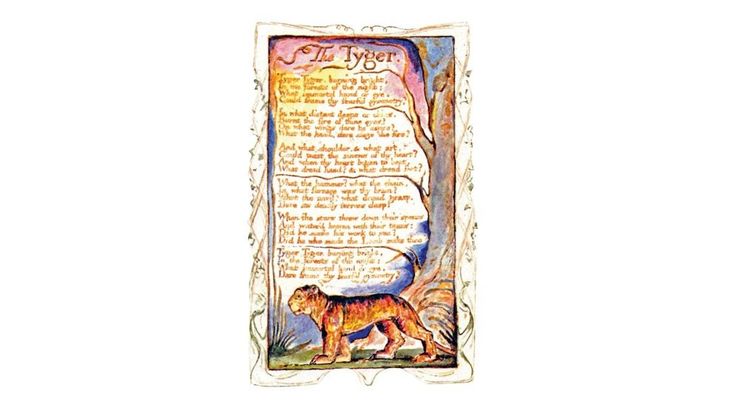
My Pretty Rose Tree
A flower was offered to me,
Such a flower as May never bore;
But I said, ‘I’ve a pretty rose tree,’
And I passed the sweet flower o’er.
Then I went to my pretty rose tree,
To tend her by day and by night;
But my rose turned away with jealousy,
And her thorns were my only delight.
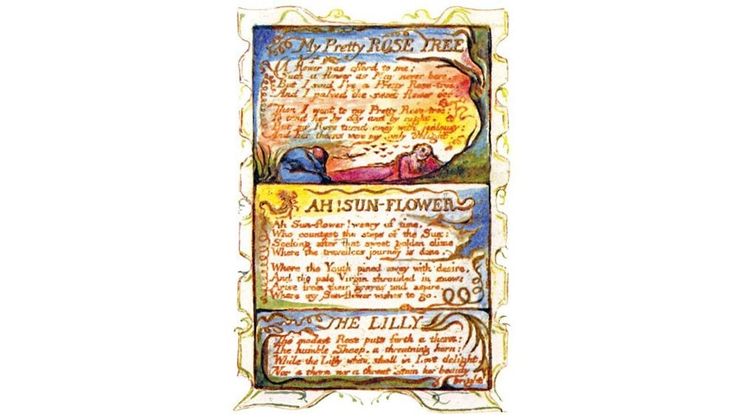
The Garden of Love
I went to the Garden of Love,
And saw what I never had seen;
A Chapel was built in the midst,
Where I used to play on the green.
And the gates of this Chapel were shut,
And ‘Thou shalt not’ writ over the door;
So I turned to the Garden of Love
That so many sweet flowers bore.
And I saw it was filled with graves,
And tombstones where flowers should be;
And priests in black gowns were walking their rounds,
And binding with briars my joys and desires.
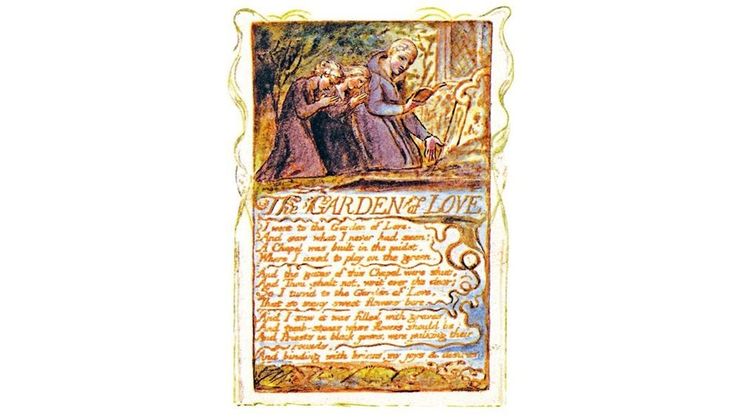
The Human Abstract
Pity would be no more
If we did not make somebody poor,
And Mercy no more could be
If all were as happy as we.
And mutual fear brings Peace,
Till the selfish loves increase;
Then Cruelty knits a snare,
And spreads his baits with care.
He sits down with his holy fears,
And waters the ground with tears;
Then Humility takes its root
Underneath his foot.
Soon spreads the dismal shade
Of Mystery over his head,
And the caterpillar and fly
Feed on the Mystery.
And it bears the fruit of Deceit,
Ruddy and sweet to eat,
And the raven his nest has made
In its thickest shade.
The gods of the earth and sea
Sought through nature to find this tree,
But their search was all in vain:
There grows one in the human Brain.
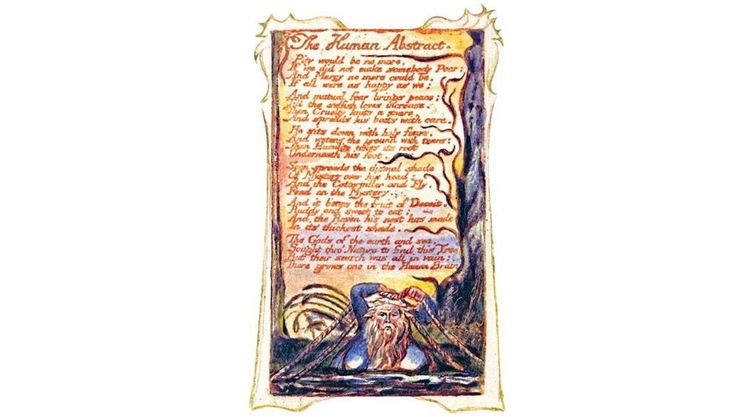
Songs of Innocence and of Experience
by William Blake
Including many of Blake’s best-loved poems, such as ‘The Tiger’, ‘The Lamb’ and ‘The Chimney Sweeper’, this beautiful edition of Songs of Innocence and Experience contains stunning reproductions of the illustrations that Blake etched himself to accompany the poems.
Explore the more brilliant classic literature.
